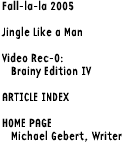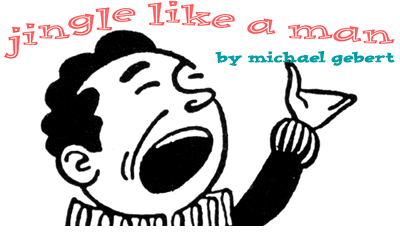


I WAS RIDING ALONG WITH MY KIDS in the spring, the first day that was nice enough that we could put the windows down and crank the oldies station up and sing old Top 40 hits at the top of our lungs, and Frankie Valli’s “Walk Like a Man” came on. Here’s a song from that supposedly fallow period between Elvis leaving for the Army and the Beatles arriving on Ed Sullivan—and it’s an amazing song, a streetcorner opera with flaming falsettos and booming basslines and a whole new melody every ten seconds. Everything late 60s rockers would get credit for in suites like “A Quick One” or side 2 of Abbey Road happens in its two minutes and seventeen seconds. (Plus, it’s just a crackup listening to your three-your-old trying to do the low parts—”boom boom boom.”)
So of course, the next time I turn on the oldies station, they’ve canned the 50s-60s oldies format and replaced it with an 80s-90s oldies format. (Now I feel oldie.) Objectively, this is not a bad thing, since their idea of the 80s and 90s is a lot more Police and Pretenders than it is Heart and Loverboy (which is what the 80s really were, admit it). But it’s not the kind of music you can sing out loud with your three-year-old; three-year-olds don’t do irony and alienation and sardonically allusive attacks on Thatcher’s England. What they do is “Woo-ee-woo-woo-ooh-woo-wa-oooooh!” And we don’t live in a woo-ee-woo time. We live in a small, cautious time, when gigantic emotion and aching sincerity and flamboyant overproduction are the most unhip things imaginable. Nobody would stand on a streetcorner and belt out true love and hormones to the sky these days; much safer to strum a single guitar (this is the unplugged era) and just have ironic ‘tude. If nothing else, we live in the golden age of ‘tude.
WHICH BRINGS US BACK TO "I'M LOVIN' IT." Now, taglines may appear to be such an essential weapon in the ad guy arsenal that it seems impossible they could ever disappear. To which I can only reply, so what happened to the jingle? Every product in America once sang its virtues with Ethel Mermanesque verve, turning its USP into Rodgers and Hammerstein—”You’ll wonder where the yellow went...” “Plop plop, fizz fizz...” “Sometimes you feel like a nut...” “My baloney has a first name....” Then jingles became passé, clichéd, campy. The last one was spotted in ironic captivity in an Old Navy spot.
Can we doubt the same thing is happening to taglines? Taglines once had the boundless confidence of pioneers heading westward—Breakfast of Champions! A tiger in your tank! Takes a licking and keeps on ticking! They drove home cheesy mnemonics without shame (Always Buy Chesterfield, ABC!) and boasted openly of their unique attributes (Melts in your mouth, not in your hand! The cereal that’s shot from guns!) They drew social distinctions as heartlessly as Ward McAllister deciding who was In society (Wouldn’t you really rather have a Buick, make it a Michelob night, send the very best? Don’t you wish everybody did?)
But then came the anti-tagline, the first pure ‘tudeline—Just Do It. Once Nike unmoored the tagline from any actual connection to the physical product, brands started talking like teenagers in a fast food parking lot—whatever dude, just do it, I’m lovin’ it. Or they sought to associate themselves in the most abstract way with the most generic, ethereal positive emotions—“United. Rising.” “American Express. Do more.” “Citibank. Kittens.”
The problem is, once companies spend quadrillions to beat ‘tudelines and vaguelines like these into our heads, we can’t go back to harder-selling slogans like “Fly the friendly skies” or “Ask the man who owns one” or “Good to the last drop.” In their directness, their naked appeal to hey, actually buy something for a reason, they seem as dated, as unironically unhip as a doo-wop song about masculinity. So while it’s possible that some brilliant marketer will produce another tagline or two that captures the imagination of the world, basically, we’re living in the post-tagline age now. We’d better be lovin’ it—because we’re stuck in it.
* * *
POSTSCRIPT: The estimable Jim Morris responded to the above thusly:
Mr. Gebert,
I'm told that the world doesn't revolve around me, so I must assume your attack on taglines wasn't a personal attack on me, Mr. Tagline. In any case, I was surprised to see you take the short view. That's not like you. While it's true that jingles have waned, I see signs that pendulum is making a timid move back. Nevertheless, jingles will likely not ever reclaim their place of prominence in the adworld. But it's not because they're dated or old-fashioned. Oh no. The only thing about jingles that's dated is the name "jingle".
Years ago, in a column on jingles, I suggested that just as "slogan" has been largely replaced with "tagline", "jingle" ought to be replaced by "spot tunes" or some other such name, simply to remove the onus from the stigma. The reason that jingles have faded is simply that clients, who seldom have a good understanding of the value of any particular element within their marketing mess, found that good, memorable jingles cost a lot of moolah up front, songwriting talent being scarce and all. And they lost track what a great investment that money was. (No single unit of advertising content approaches the memorability and emotional power of a good jingle. That fact cannot be ignored forever.)
Therefore, clients stopped being willing to pay for a good jingle. I predict that, most things in advertising being cyclical, jingles will experience a renaissance. All it will take is for someone at CP&B or some such hot shop to decide to push a trusting client with a visible brand to spend the money and soon thereafter we will hear whatever today's equivalent of "We've Only Just Begun" sounds like. Then the adsheep will flock to this exciting new idea, and jingles will be back.
But my larger concern is your dismissal of taglines as dinosaurs. Taglines will always and forever be a critical part of the brand communication mix. We are merely suffering under one of those pendulum swings, in which people are writing and selling some exceptionally weak and stupid lines. One word lines are almost invariably ill-conceived. And many of the attitude-lines you refer to are similarly vacuous and absent any longevity. No amount of money spent on beating these lines into our heads will succeed. Long after "I'm lovin it" and "Did somebody say McDonald's?" have faded from memory, "You deserve a break today" will remain. And that's not even that great a line. But it had the advantage of being jingle-aided.
Clients will always have an appetite for the tagline. And there will always be a need for a succinct, memorable hint at the brand's meaning.
"Taglines are the poetry of advertising." -- Chairman Jimmy